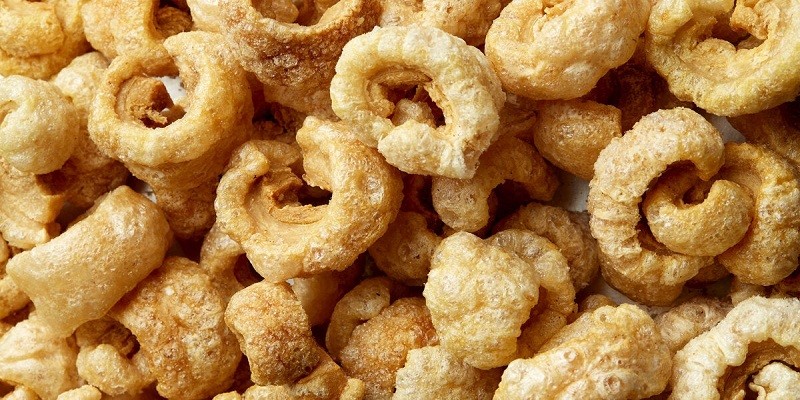Last Updated on May 29, 2024
Yes, you can eat pork rinds while pregnant, provided they are well-cooked and consumed in moderation. Properly cooked pork rinds are safe and can be a part of a balanced diet during pregnancy, but it’s important to be mindful of their high fat and sodium content.
Pregnancy often brings about numerous dietary concerns and questions. One common query is whether pork rinds are safe to consume during this period. Pork rinds, also known as chicharrones, are a popular snack made from fried pig skin. This article explores the safety, nutritional value, risks, and safe consumption practices of pork rinds during pregnancy.
What is Pork Rinds?
Pork rinds are a snack made from the skin of pigs. The skin is typically boiled, dried, and then deep-fried or baked until it becomes crispy. This process results in a crunchy, savory snack that is high in protein and fat but contains no carbohydrates. Pork rinds are popular in various cultures and are often enjoyed by those following low-carb diets like keto or paleo.
Nutritional Value of Pork Rinds
| Nutritional Value | Details |
|---|---|
| Calories | 160 per ounce (28 grams) |
| Protein | 18 grams per ounce |
| Fat | 9 grams per ounce (mostly monounsaturated) |
| Carbohydrates | 0 grams |
| Cholesterol | 15 mg per serving |
| Sodium | 520 mg per ounce |
| Vitamins | Rich in B vitamins |
Risks of Eating Pork Rinds During Pregnancy
| Risks | Details |
|---|---|
| High Sodium | Can increase blood pressure and risk of hypertension |
| Saturated Fat | High levels can raise LDL cholesterol levels |
| Contamination | Risk of bacterial contamination if not properly cooked |
| Additives | May contain artificial preservatives and flavor enhancers |
Safe Ways to Eating Pork Rinds During Pregnancy
To safely enjoy pork rinds during pregnancy, ensure they are well-cooked to eliminate any harmful bacteria. Opt for brands that do not contain artificial preservatives and are lower in sodium. Moderation is key; limit your intake to avoid excessive consumption of fat and sodium. Pair pork rinds with nutrient-dense foods to balance your diet.
Alternatives to Pork Rinds During Pregnancy
| Alternatives | Precautions |
|---|---|
| Baked Chips | Choose low-sodium options |
| Veggie Chips | Ensure they are not overly processed |
| Air-Popped Popcorn | Avoid excessive butter and salt |
| Nuts and Seeds | Opt for unsalted varieties |
| Cheese Crisps | Check for added preservatives |
Experts Tips
- Moderation is Key: Enjoy pork rinds occasionally and in small amounts to avoid excessive intake of sodium and fat (Source: Healthline).
- Check Labels: Always read the nutritional labels to ensure the product is free from harmful additives and preservatives.
- Pair with Healthy Foods: Combine pork rinds with vegetables or other nutrient-rich foods to create a balanced snack (Source: NCBI).
FAQs
Can I eat pork rinds if I have gestational diabetes?
Yes, pork rinds are low in carbohydrates, making them a suitable snack for those managing gestational diabetes. However, consume them in moderation due to their high fat and sodium content (Freedom and Glory Nutrition).
Are pork rinds a good source of protein during pregnancy?
Pork rinds are high in protein, providing about 18 grams per ounce. This can help meet the increased protein needs during pregnancy (PorkRinds.com).
What are the risks of eating too many pork rinds while pregnant?
Excessive consumption of pork rinds can lead to high sodium intake, increasing the risk of hypertension and other cardiovascular issues (Livestrong).
Can pork rinds cause food poisoning during pregnancy?
Properly cooked pork rinds are safe to eat. Ensure they are cooked at high temperatures to kill any harmful bacteria (Netmums).
Are there any benefits to eating pork rinds during pregnancy?
Pork rinds can be a good source of protein and healthy fats, which are essential for fetal development. However, they should be consumed in moderation (Healthline).
Conclusion
Pork rinds can be safely enjoyed during pregnancy if they are well-cooked and consumed in moderation. They offer a high-protein, low-carb snack option but come with risks such as high sodium and fat content. By following safe consumption practices and considering healthier alternatives, pregnant women can satisfy their cravings while maintaining a balanced diet.

